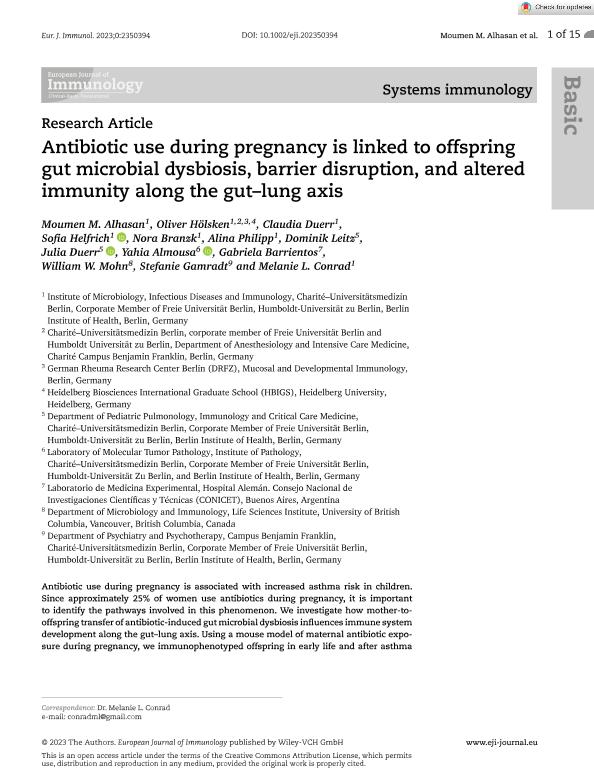Artículo
Antibiotic use during pregnancy is linked to offspring gut microbial dysbiosis, barrier disruption, and altered immunity along the gut–lung axis
Alhasan, Moumen M.; Hölsken, Oliver; Duerr, Claudia; Helfrich, Sofia; Branzk, Nora; Philipp, Alina; Leitz, Dominik; Duerr, Julia; Almousa, Yahia; Barrientos, Gabriela Laura ; Mohn, William W.; Gamradt, Stefanie; Conrad, Melanie L.
; Mohn, William W.; Gamradt, Stefanie; Conrad, Melanie L.
 ; Mohn, William W.; Gamradt, Stefanie; Conrad, Melanie L.
; Mohn, William W.; Gamradt, Stefanie; Conrad, Melanie L.
Fecha de publicación:
07/2023
Editorial:
Wiley VCH Verlag
Revista:
European Journal of Immunology
ISSN:
0014-2980
Idioma:
Inglés
Tipo de recurso:
Artículo publicado
Clasificación temática:
Resumen
Antibiotic use during pregnancy is associated with increased asthma risk in children. Since approximately 25% of women use antibiotics during pregnancy, it is important to identify the pathways involved in this phenomenon. We investigate how mother-to-offspring transfer of antibiotic-induced gut microbial dysbiosis influences immune system development along the gut–lung axis. Using a mouse model of maternal antibiotic exposure during pregnancy, we immunophenotyped offspring in early life and after asthma induction. In early life, prenatal-antibiotic exposed offspring exhibited gut microbial dysbiosis, intestinal inflammation (increased fecal lipocalin-2 and IgA), and dysregulated intestinal ILC3 subtypes. Intestinal barrier dysfunction in the offspring was indicated by a FITC-dextran intestinal permeability assay and circulating lipopolysaccharide. This was accompanied by increased T-helper (Th)17 cell percentages in the offspring's blood and lungs in both early life and after allergy induction. Lung tissue additionally showed increased percentages of RORγt T-regulatory (Treg) cells at both time points. Our investigation of the gut–lung axis identifies early-life gut dysbiosis, intestinal inflammation, and barrier dysfunction as a possible developmental programming event promoting increased expression of RORγt in blood and lung CD4+ T cells that may contribute to increased asthma risk.
Palabras clave:
ANTIBIOTICS
,
ASTHMA
,
GUT–LUNG AXIS
,
PREGNANCY
,
TH17 CELL
Archivos asociados
Licencia
Identificadores
Colecciones
Articulos(SEDE CENTRAL)
Articulos de SEDE CENTRAL
Articulos de SEDE CENTRAL
Citación
Alhasan, Moumen M.; Hölsken, Oliver; Duerr, Claudia; Helfrich, Sofia; Branzk, Nora; et al.; Antibiotic use during pregnancy is linked to offspring gut microbial dysbiosis, barrier disruption, and altered immunity along the gut–lung axis; Wiley VCH Verlag; European Journal of Immunology; 53; 10; 7-2023; 1-15
Compartir
Altmétricas



